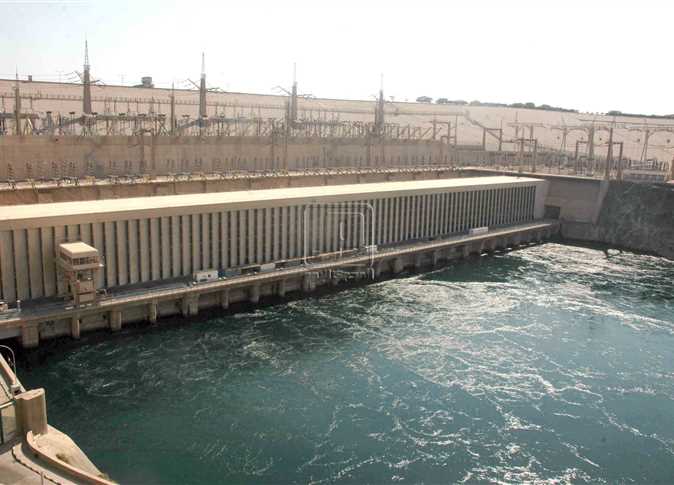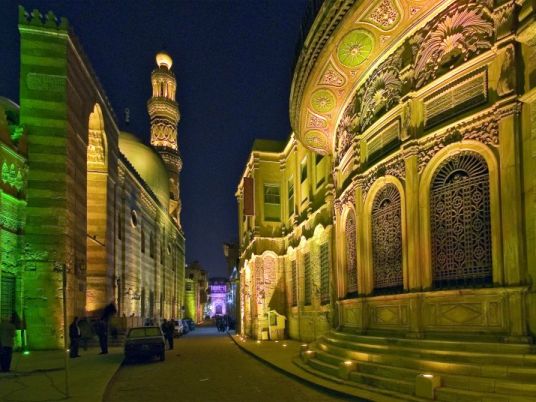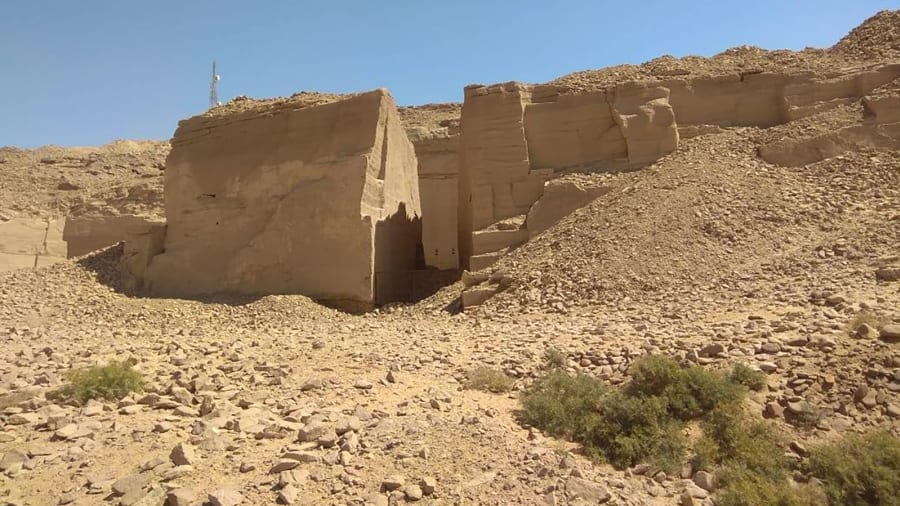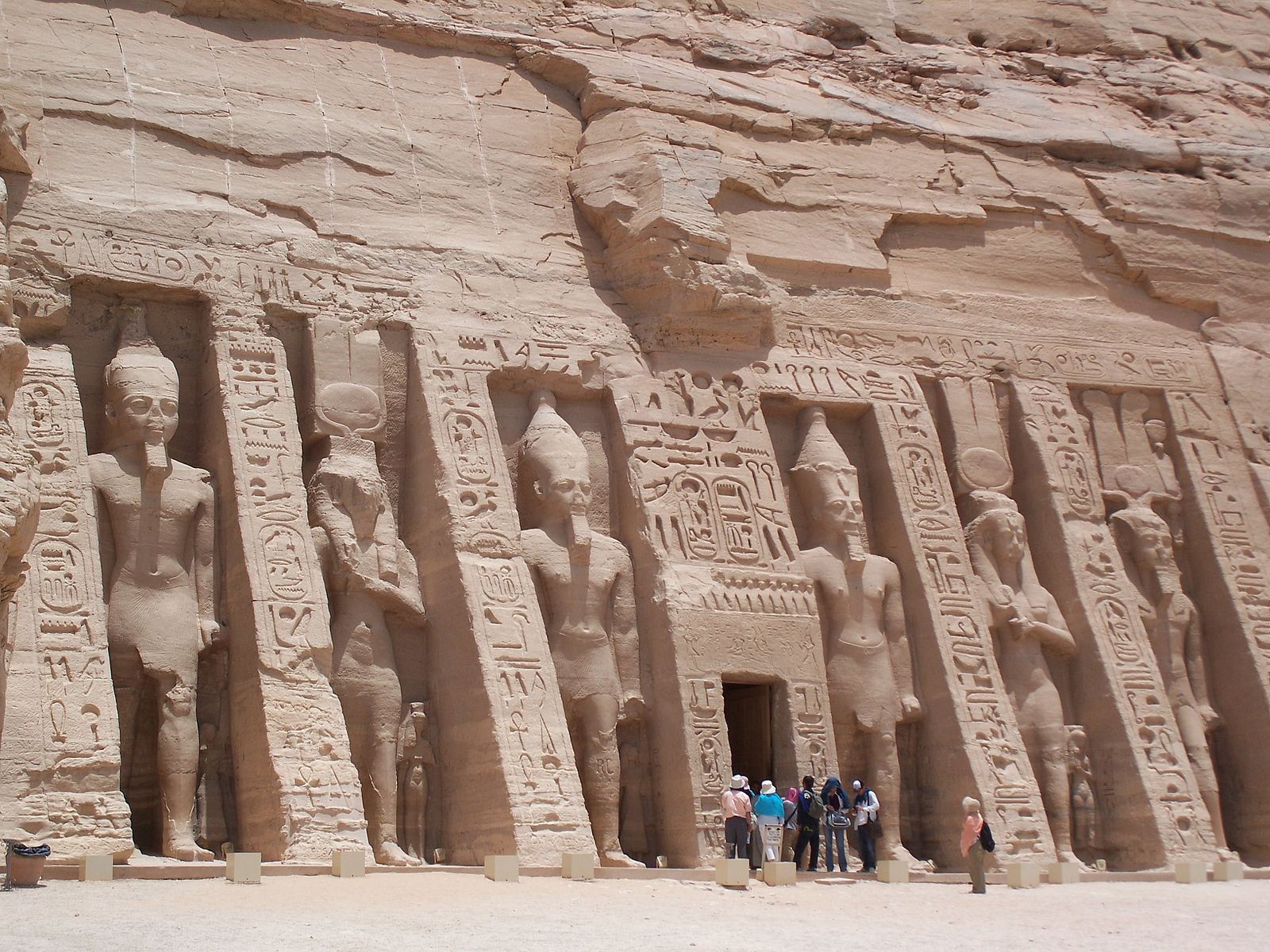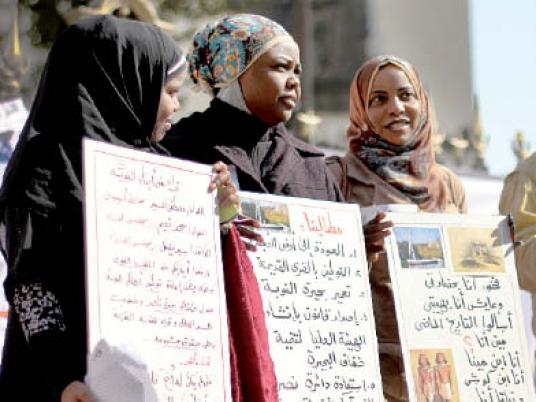
The previous head of the General Nubian Club, Mosaad Herky, was closely affiliated with the then-ruling National Democratic Party. During the 18 days of mass protests in January 2011, Nubian youth protesting in Tahrir Square had wanted to use the club premises, which overlooks the square, as a field hospital. They weren’t allowed to.
Currently presided over by Mohamed Saleh Zaki, the club is now quite different, offering a space to gather, talk, plan and strategize, along with activities such as Nubian language lessons.
Appraising the impact of the revolution, renowned Alexandria-based Nubian novelist Haggag Odoul says, “Two years isn’t enough to root out 60 years of corruption and problems, but people have started talking with more courage — Nubians, and the Bedouin and Copts as well.”
In 2005, Odoul had been widely condemned for comparing the Nubian forced migration to the expulsion of the Palestinians at a conference about minorities in the US.
With the building of the High Dam under late President Gamal Abdel Nasser, Nubians were forced to move — not for the first time in their recent history. While official documentation refers to it as resettlement, Nubians increasingly refer to this move as forced displacement.
When activists speak of Nubian rights, first and foremost is the question of return.
“But it is not just about return,” young leftist and Nubian activist Yahia Zaied says. “There has to be political will for development.”
Full citizenship would also entail the teaching of Nubian history in schools as an integrated part of Egypt’s history, and the teaching and protection of the Nubian language.
“Now it has become more normal to talk about return,” Odoul asserts. “We were moving step by step, and with the revolution, these steps have become faster.”
The basic question of land remains fraught. In July, in response to protests, the agriculture minister canceled an auction on Nubian land. Meanwhile, the Egyptian Nubian Association for Lawyers is pushing for two laws it has drafted, one guaranteeing the Nubian right of return and one promoting the development of historical Nuba.
A collective of young people have begun farming and working the land of 22 Nubian villages.
“It is a red line for anyone to think that because we are doing this, we have our rights,” warns one of the co-founders, Mohamed Ezz Eddin, who lives between Cairo and Aswan.
In April last year, young Nubian and feminist activist Fatma Emam was one of the organizers of a blog for Nubia day.
“What was most successful about it,” she says, “is that it wasn’t just Nubians participating.”
“And I don’t think it could have been possible on the same scale before the revolution. People’s Internet behavior has really changed,” she adds.
Sanaa Sirr al-Khitm lives in Aswan and either she, or another member of an informal group of activists, comes to Cairo every week.
“It is important to build links,” she says, “to know and be involved in what is happening here as well.”
The gap between Nubians in Aswan and urban centers is narrowing, Emam says, pointing to the Internet as a useful tool.
“But it is a fundamental problem of the center and margin that will never be fully solved,” says Eman.
The revolution, most Nubian activists assert, has seen change on the level of the people but not state power, marked more by continuity than rupture.
Leading Muslim Brotherhood member Essam al-Erian wrote an op-ed including the Nubians among those who had colonized Egypt. President Mohamed Morsy tried to correct the mistake, stoking more anger when he referred to the community with the term used to describe expat communities.
General Mostafa Sayed, governor of Aswan — the site of historical Nuba — is the only governor who has held his post since before the revolution, although he did, briefly, resign in 2012.
During Eid, Nubians from all over the country go to Aswan, Zaeid explains, asserting that Sayed resigned before Eid to pre-empt heightened calls for his removal. Three months later, he was reappointed.
Nubian activists had put a number of names forward for the Constituent Assembly, tasked with drafting the Constitution. But Manal al-Tiby, the only Nubian member, who later resigned, was “chosen under the category of public figures — not as a representative of the Nubian people,” Emam explains angrily.
Zaied similarly fumes about the Shura Council: “I am against appointments anyway, but there is not a single Nubian on the list.”
Nubian activists are seeking a different kind of representation, one that replaces the old guard — some of whom saw the prime minister in December at a meeting to which most prominent Nubian activists were not invited.
The use of the term “feloul” representatives — remnants of the old regime — points to an internal struggle among Nubians, one that pits effective against tokenistic representation.
The current period could be an incubation period for a new cadre of leaders, and perhaps one with a different notion of leadership.
Now that many young people are members of the Nubian Club, Zaied explains, they are hoping for greater youth representation in the coming club elections, which take place every three years.
“The generational dynamic among Nubians is the same as in Egypt in general,” Emam says.
Undertaking doctoral research in 2010, Alia Mossallem observed that 50 years since the building of the Aswan High Dam, it was Nubian youth increasingly raising the demand for the right of return.
The anger of these youth, she argued, was not just directed at the state, but also had a generational element: It was a direct challenge to the idea embraced by older generations that the migration was a sacrifice they had made for the nation and for former President Gamal Abdel Nasser and the ideas he espoused — a sacrifice that was worth it.
Nubians who participated in the revolution did so as Egyptians and Nubians, not either/or, believing that a democratic state — some specifically assert a civilian state — would be better for all Egyptians.
Ahmed Green is emphatic: “I have a Nubian identity and an Egyptian identity. There is no contradiction at all.”
And he is not the only one.
Most Nubians see themselves as fully and entirely Egyptian but it all depends on how you define Egyptian. They point to a broader and, they say, more realistic notion of what Egypt is.
“A nation is like a body with different parts,” says Odoul. “But this idea of diversity clashes with a dictatorship mentality. A weak state will try and make their citizens the same, like in a production line.”
Emam agrees that this idea of national unity as “sameness” is tied to a dictatorship mentality.
“You remember when Amr Moussa took a line that was just a tiny bit different about Israel and Palestine, and then he was sent off to the Arab League?” she asks rhetorically. “The problem is where you think that to be Egyptian, you have to be Arab and Sunni,” she says.
Constitutional articles that refer to Egypt’s “cultural and linguistic unity,” entrench this understanding. Article 1 emphasizes Egypt’s Arab and Islamic identity, delegating its African aspects, while Article 10 affirms the state’s duty to protect Arab culture.
While Article 30 protects citizens against different forms of discrimination, the drafters ignored calls to include ethnic and racial discrimination in the article.
When talk of rights come up, many recount, non-Nubian Egyptians feel threatened. A number of activists put this down to ignorance, underlining their call for more informed education.
“In Egypt, you know, when someone is different somehow, then people just stare. So if I am talking with my friends in Nubian, often people stare and laugh,” Haytham Hamouda says.
Hamouda, who is bilingual, having lived for some years in his teens in Aswan, says they don’t mean it — they just don’t know.
“Even if it’s unintentional, it’s still racism,” says Hamouda.
He often reminds them of the historical role Nubians have played in, and for, Egypt.
Recently, Hassan Farag, a young Nubian living in the Cairo working-class district of Imbaba, has been going to the General Nubian Club less often, overcome by a feeling of hopelessness in relation both to Nubian rights as well as the revolutionary demand of social justice.
An optimism persists among many, however, not because the government’s attitude is any different from before the revolution, but because many of those who had been silent, or spoke in low voices, are now speaking out, demonstrating and being increasingly insistent in claiming their rights.
“If a part of the Egyptian people don’t have their rights, there isn’t justice,” Green says.
The “Nubian question” is not one that stands alone, but is intimately tied up with race, class, democracy and citizenship.
For Emam, “it is a Nubian issue because it is a question of land, culture and identity, a national one because full citizenship for all means a better country, and finally a revolutionary issue, as it is part of the question of justice.”
This piece was originally published in Egypt Independent's weekly print edition.

